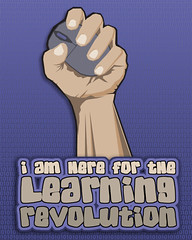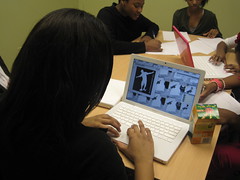First off, I am beyond pleased to have found this photo and even more thrilled when I found it was part of Wes Fryer’s photo stream. I thought it was perfect given my current experiences with tech, both as a teacher and a learner.
I recently completed my 1st semester of doctoral work at Pepperdine University. I’m studying educational technology through a hybrid program which requires me to attend several face to face meetings throughout the next few years, as well as complete an online component.
My classmates and I chat regularly about our readings on social learning theory, leadership, school reform and a slew of other topics related to technology and education. We use a variety of forums to accomplish this including google groups, BlackBoard, and a few web-based collaboration tools like Etherpad.
Still a relatively new phenomenon, online education has recently been the topic of numerous research studies, attempting to prove ( or disprove) its overall value and effectiveness for learners. Since this area of education is also a research interest of mine, I decided to weigh in citing my personal experiences thus far.
Here are my initial thoughts, reflecting, rantings etc:
1) Online instruction is not “easier” than attending a traditional graduate school program, in fact it can prove to be more challenging since you’re not physically in contact with your instructors as much.
2) You must be disciplined to have success with online schooling. If not, you’ll find yourself falling behind and there’s no one there to push you, except yourself!
3) Research! Research! Research! I looked at several programs during my application process, both traditional and blended. Some required lots of face to face interaction, while others had relatively little. Find one that fits your needs and be honest with yourself.
4) ASK ABOUT ACCREDITATION! Surprisingly, not all programs with an online component are fully accredited. I actually know someone who earned an MBA from an online school, only to found out it meant nothing- what a waste of time and money!
5) If possible, find students who are or have attended the institution the schools you’re interested in- I found some useful information simply by googling- student reviews and the institutions’ names.
6) Dig up information on graduates of the programs you’re looking at- Pepperdine readily provided this information on their website. I was, (and still am) impressed by the accomplishments of Pepperdine Alum, and it keeps me motivated when I feel frustrated.
7) Use common sense- if something sounds to good to be true it usually is.
8) Be patient but honest- most schools are still trying to “work out the kinks” in terms of what works when delivering content online. Speak up if something isn’t working for you- remember your are making a valuable investment and deserve a top-notch education for the time and money you’re putting in.
9) Remember that no man is an island- my programs is a cohort model and my classmates are awesome! Find a network to help you get you through the tough times.


